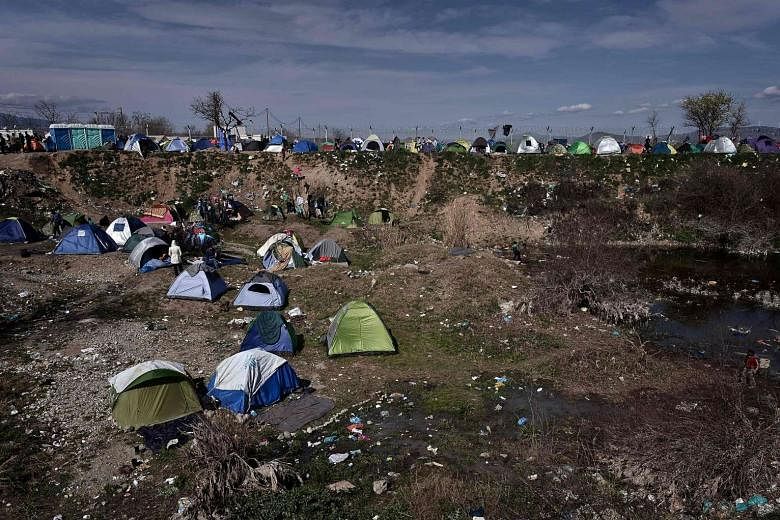BRUSSELS (Reuters) - EU leaders expressed guarded optimism before a summit with Turkey on Monday (March 7) that Ankara was finally ready to act to curb a flood of migrants crossing illegally into Europe.
They also voiced concern, tinged with embarassment, that increased Turkish cooperation coincides with a crackdown on media freedom that runs counter to cherished European values.
Prime Minister Ahmet Davutoglu said the half-day meeting would also address Ankara's bid to join the European Union and he hoped for a "turning point", adding that Turkey was indispensable for the EU, just as Europe was for Turkey.
With tens of thousands of migrants stranded in Greece by closing borders, the summit will formally declare closed the Balkan route from Greece to Germany, diplomats said.
Leaders will pledge help to Athens cope with the backlog and seek assurances that Turkey, with NATO naval back-up in the Aegean, will stop people smugglers putting migrants to sea.
"I hope we will make a step forward to achieving these goals today but that will take difficult negotiations so it may take a while to get a result," German Chancellor Angela Merkel said.
Merkel and Dutch Prime Minister Mark Rutte, whose country holds the rotating EU presidency, spent five hours talking with Davutoglu in Brussels until 2.45 a.m. to try to nail down commitments to halt the migrant flow after more than one million people - mostly Syrians, Iraqis and Afghans - entered Europe last year, most ending up in Germany.
"I am sure these challenges will be solved through our cooperation and Turkey is ready to work with the EU," Davutoglu said. "Turkey is ready to be a member of the EU as well. Today I hope this summit will not just focus on irregular migration but also the Turkish accession process to the EU."
Merkel, who faces a possible political backlash against her welcome for the refugees in three regional elections on Sunday, requested the emergency summit to show voters the EU is acting to resolve the crisis.
Her finance minister, Wolfgang Schaeuble, said on Sunday that Berlin had major doubts about whether Turkey should become a member of the EU.
Before the summit, EU officials told Davutoglu of their concerns about human rights after the Turkish government seized control of a critical newspaper, top-selling daily Zaman.
European Parliament President Martin Schulz said he had told the Turkish premier that media freedom was "a non-negotiable element of our European identity" and they had differed sharply.
The migrant crisis meant the EU needed to work with Turkey even if it was in "total disagreement" with its policies, he said.
A German government spokesman said Merkel had also raised press freedom with Davutoglu.
The EU is taking care not to alienate Ankara just as hopes are rising of a solution to the migration problem.
Fellow EU leaders, long divided over how to end chaotic movements that have put Europe's Schengen open border system in jeopardy, will also assure Greek Prime Minister Alexis Tsipras of help housing migrants now stranded in Greece.
Tsipras said the bloc must speed up the process of relocating registered asylum seekers from Greece to other EU countries as promised last September. EU states have so far taken in only a few hundred of a promised 160,000 people. "In Europe we have some principles, some values - one was sharing responsibility, sharing the burden, sharing solidarity,"Tsipras said.
"Everyone has to implement our common decisions."
"ROUTE CLOSED"
An EU endorsement of border closures by Macedonia, Austria and other countries on the route north from Greece will be accompanied by a renewed commitment to revive the relocation plan, diplomats said.
A draft EU statement seen by Reuters said: "Irregular flows of migrants along the Western Balkans route are coming to an end; this route is now closed." Diplomats said the text could still be modified.
NATO said on Sunday a new naval force had approval to operate in Turkish and Greek waters. That will lend force to a deal with Turkey to take back migrants halted in its waters and those who reach Greek islands but do not qualify for asylum.
Germany has been pushing for direct resettlement of thousands of Syrian refugees from the 2.9 million in Turkey. But diplomats say that is unlikely to be discussed in detail by other EU leaders until they see flows from Turkey are falling.
Over a weekend that saw at least another 25 people drown in the straits, Turkish police mounted a raid on a beach opposite Lesbos. Reuters journalists saw them stop some 120 migrants from leaving and arrest at least two from a migrant-smuggling gang.
However, some 33,000 migrants are bottled up in Greece and about 2,000 more have been arriving daily.
British Prime Minister David Cameron said he was sending a naval ship and three coastguard boats to the Aegean to join German and Canadian warships in the NATO force assisting the Greek and Turkish navies.
Though Britain is outside the Schengen zone, further migrant chaos in Europe could damage Cameron's efforts to win a June referendum and keep Britain in the EU.

